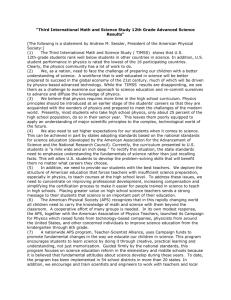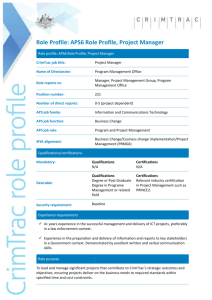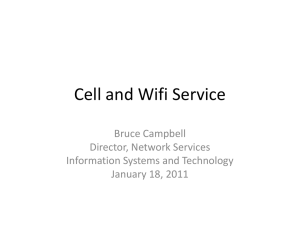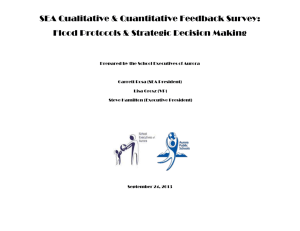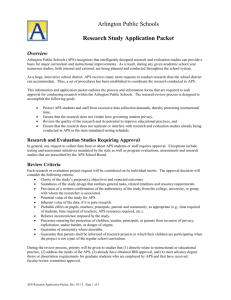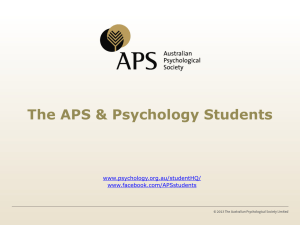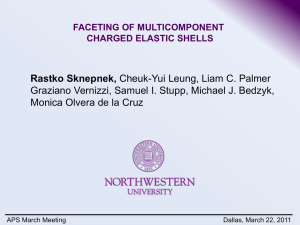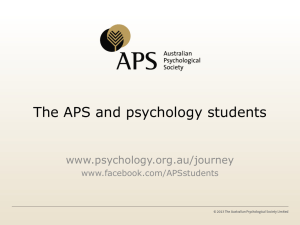APS Teacher Evaluation - Arlington Public Schools
advertisement
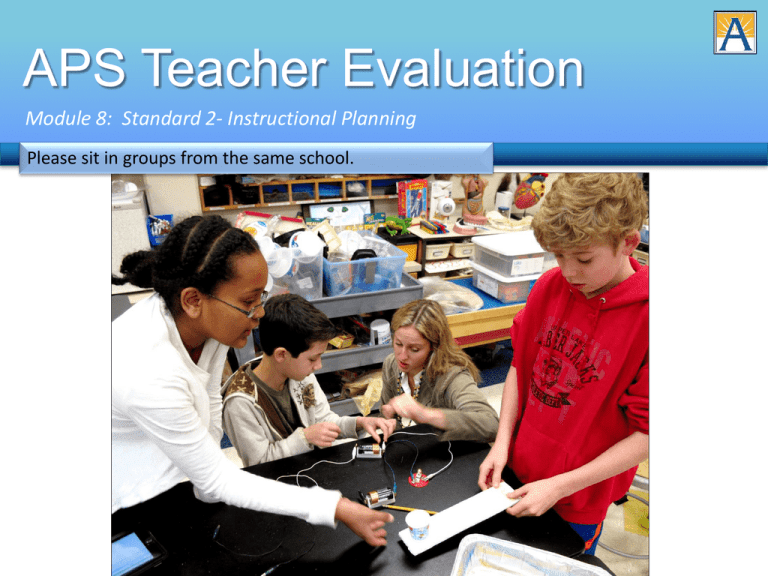
APS Teacher Evaluation Module 8: Standard 2- Instructional Planning Please sit in groups from the same school. Brainstorm What are 8 things that you would expect to see in an effective lesson? Your Logo Anticipation Guide Your Logo APS Teacher Evaluation Process Overview Writes Lesson Plans Writes Compiles Participates Participates Participates SMART Goal Document Log Observations Mid-Year Evaluation Approves Reviews Facilitates Facilitates Conducts Lesson Plans Monitors 4 Agenda 1. Teacher Performance Standard 2 Instructional Planning 2. APS Lesson Plan Key Elements 3. Application 5 Enduring Effective instruction must be planned. Understanding Essential Question Standards Content Objectives Language Objectives What is required for effective instructional planning? The teacher plans using the Virginia Standards of Learning, APS curriculum, effective strategies, resources, and data to meet the needs of all students. Participants will be able to: Write lesson plans including the key elements. Participants will be able to: Read Read the text to ask and answer questions to demonstrate comprehension. Write Given a topic, use key vocabulary to collaboratively write a lesson plan using the key elements Speak Use the key vocabulary in an oral description of examples for the various elements of the lesson plan. Listen Listen to a colleague's example and assess accuracy. 6 Performance Standard 2: Instructional Planning/Program Planning and Management The teacher plans using the Virginia Standards of Learning, APS curriculum, effective strategies, resources, and data to meet the needs of all students. The educational specialist effectively plans, coordinates, and implements programs and services consistent with established guidelines, policies, and procedures. Sample Performance Indicators Examples of teacher work conducted in the performance of the standard may include, but are not limited to: Uses student learning data to guide planning. Examples of educational specialist work conducted in the performance of the standard may include, but are not limited to: Uses assessment information in making recommendations or decisions that are in the Plans time realistically for pacing, content Planning/Program Performance Standard 2: Instructional Planning and Management best interest of the learner/school/district. mastery, and transitions. The teacher plans using the Virginia Standards of Learning, APS curriculum, effective strategies, resources, and data to meet the needs of all students. Plans for differentiated instruction. Aligns lesson objectives to the school’s curriculum and student learning needs. Develops appropriate long- and short-range plans, and adapts plans when needed. The educational specialist effectively plans, coordinates, and implements programs and services consistent with established guidelines, policies, and procedures. Uses state and local assessment data to modify strategies, interventions, services, and program effectiveness. Provides services that will support mastery of state and national standards and guidelines. Develops appropriate long- and short-range plans, and adapts plans when needed. How is Standard 2 Measured? Effective Effective is the Highly Effective* expected level of performance. In addition to meeting The teacher plans the standard, the using the Virginia teacher actively seeks Standards of and uses alternative Learning, APS Teacher data and resources and curriculum, consistently effective strategies, differentiates plans to resources, and data meet the needs of all to meet the needs students. of all students. The educational The educational specialist plans, specialist coordinates, and effectively plans, implements programs coordinates, and Educational and services consistent implements Specialist with established programs and guidelines, policies, services consistent and procedures in a with established highly effective guidelines, policies, manner. and procedures. Developing/Needs Improvement Ineffective The teacher inconsistently uses APS curriculum, effective strategies, resources, and data in planning to meet the needs of all students. The teacher does not plan, or plans without adequately using APS curriculum, effective strategies, resources, and data. The educational specialist inconsistently plans, coordinates, and implements programs and services consistent with established guidelines, policies, and procedures. The educational specialist rarely plans, coordinates, and implements programs and services consistent with established guidelines, policies, and procedures. Plans Teacher Evaluation Handbook p. 21 “Written plans (e.g. lesson plans or workshop agendas/outlines) provide evidence of knowledge and planning and need to be available for an evaluator at any time. For an announced observation, the teacher needs to provide the plan to the evaluator before the visit to the classroom. The APS Guide to Key Elements of a Lesson Plan and Observation form can be found in Section III of the Handbook. Other forms of communication are at the discretion of the evaluator.” Additional Reading Brief 4 Instructional Planning 10 Windshield Check for Understanding • CLEAR = I get it! • BUGS = I get it for the most part, but some things are still unclear. • MUD = I still don’t get it! 11 2) APS Lesson Plan Key Elements 12 Presentation Lesson Video- World War I: Writing From the Trenches APS Gunston Middle School Barbara Formosa and Greg Cabana 13 What key elements did you see? • Discuss in pairs • Share out key elements from the video 14 Practice In this particular grade level- what does _____(insert key element)___ look like? 15 Stations- Examples of Grade Level Specific Key Elements 1. Circle 4 key elements that you would like to spend more time learning about/practicing 2. Around the room are posters with information about each key element. – Stand by one poster (no more than 4-6 per poster) – Brainstorm examples of that element in your instructional planning – Repeat 3 more times 3. Grab a partner and gallery walk 4. Debrief as a group 16 3) Application: Plan A Lesson • Collaboratively plan a lesson including the key elements – If you need suggestions on a typical third quarter objective for Math, Reading, Science or Reading send a representative up to the front to take copies back to your table. – Record the lesson on chart paper as evidence of understanding the key elements 17 Debrief- Collaborative Lesson Planning • What was a successful part of this activity? • What was a challenge in this activity? 18 Closure Enduring Understanding Effective instruction must be planned. Essential Question What is required for effective instructional planning? Standards The teacher plans using the Virginia Standards of Learning, APS curriculum, effective strategies, resources, and data to meet the needs of all students. Content Objectives Language Objectives Participants will be able to: Write lesson plans including the key elements. Participants will be able to: Read Read the text to ask and answer questions to demonstrate comprehension. Write Given a topic, use key vocabulary to collaboratively write a lesson plan using the key elements Speak Use the key vocabulary in an oral description of examples for the various elements of the lesson plan. Listen 19 Listen to a colleague's example and assess accuracy. Check for Understanding: • Return to Anticipation Guide • Action Plan • Exit ticket 20 Anticipation Guide 1. Content objectives address the topic of study and what will be learned. 2. Language objectives address two skills: listening and speaking. 3. Key vocabulary is introduced at the beginning of the lesson. 4. Because time is an issue, it is not necessary to review the previous day's lesson. 5. The hook, or motivation for the lesson, is a time to assess students. 6. Assessment occurs at the beginning, middle and end of the lesson. 7. Teachers model the activity during the practice phase of the lesson plan. 8. The application/activity phase of the lesson is a good place to differentiate. 9. Students share their findings during the closure component of the lesson plan. 10. Though some lessons may span more than one day, all the key elements should be evident every day. 21 APS Teacher Evaluation Vision Since 1999 “Arlington Public Schools will provide every student with highly effective educators that have the necessary tools to positively impact student learning and growth.” 22 Language Objectives • State how students will use language to master the content • Include all four language domains – reading, writing, speaking and listening • Build academic language proficiency • Students need time to practice using all four language domains to develop understanding of the content Language Objectives Key Questions When Writing language Objectives • Is the objective observable? • How will you assess student mastery? • Are the language objectives focused on the academic language and/or language processes you expect students to use? • Are the objectives written in student-friendly language? Consider: What are the language demands of the content objective? Language functions – e.g. define, describe, explain, classify, compare, summarize, sequence Academic vocabulary – (e.g. discipline-specific, test vocabulary, transition words) Language structures – (questions, past tense, writing a complete sentence, writing a paragraph) Language Objectives Example: The Water Cycle - Language Objectives Student will be able to: • Read – Read the text to ask and answer questions to demonstrate comprehension. • Write – Use key vocabulary and transition words to describe the water cycle process. • Speak – Describe the water cycle while viewing a diagram. – Use the key vocabulary in an oral description of the water cycle. • Listen – Listen to a partner’s description and assess accuracy. Content Objectives Content objectives: • are derived from the state content standards • should emphasize the key components of the topic • should be clear, direct, observable and student-friendly • Should build connections to prior background knowledge of key vocabulary and concepts • Students need time to practice using all four language domains to develop understanding of the content APS Teacher Evaluation A Process for Student and Teacher Growth
